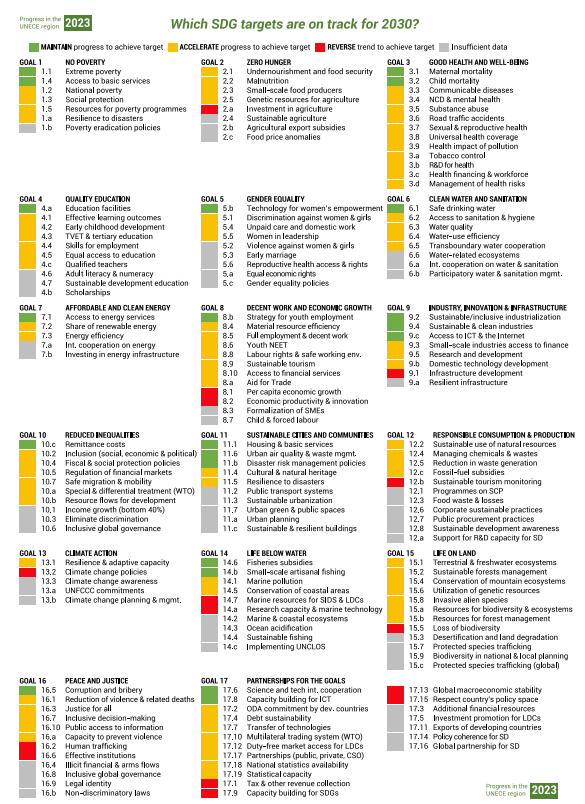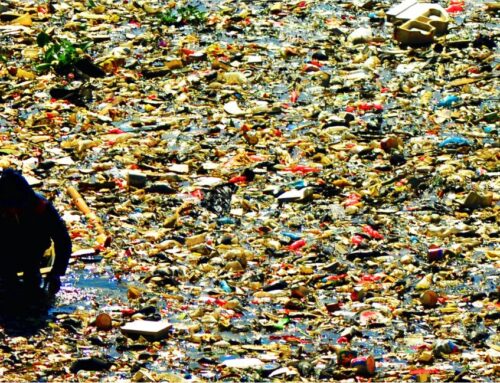2023 marks the halfway point in the global journey towards the implementation of the United Nations 2030 Agenda.
The major global crises of recent years have slowed progress towards the SDGs.
Several detailed reports note the slowdown in the implementation of the Sustainable Development Goals in Europe.
Part 1 – Europe and UNECE
The SDG 2023 Summit will be held in September during the United Nations General Assembly in New York
The year 2023 is full of events related to sustainable development. It is also the year that marks the halfway point in the global journey towards the implementation of the United Nations 2030 Agenda, and whether or not the 17 Sustainable Development Goals (SDGs), broken down into 169 targets for the period 2015-2030, will be achieved.
The major global crises of recent years, including the covid-19 pandemic, the war in Ukraine and climate change, have slowed progress towards the SDGs. The United Nations Development Program estimates that these events have contributed to reversing the human development curve for the first time in decades [1].
In the run-up to the SDG 2023 Summit, several detailed reports note the slowdown in the implementation of the Sustainable Development Goals in Europe.

According to the European Environment Agency the total ecological footprint of the 27 EU member states (plus the United Kingdom) is more than twice the “biocapacity” of the region’s ecosystems.
The publication analyzes European policies and considers three scenarios for Europe’s achievement of the SDGs and identifies associated risks.
It advocates a more focused cooperation of the Parliament, the Commission and the Member States as well as the scientific community, local governments, civil society and the private sector.
In Europe: call for more focused cooperation to avoid slippage beyond 2030
In January 2023, the European Parliament think tank published an in-depth study on the implementation of the SDGs [2]. This report, commissioned by the Parliament’s Development Committee, aims to prepare the institution for political and legislative debates ahead of the September meeting. It paints a rather negative picture of the state of Europe’s implementation of the SDGs and begins to envisage a slide beyond 2030.
The report highlights the complexity of the sustainable development goals that must respect the 9 planetary limits. Thus, the pursuit of the socio-economic goals (14 SDGs) will exert environmental pressures on the planetary limits and on the other environmental SDGs (SDGs 13, 14 and 15). According to the European Environment Agency the total ecological footprint of the 27 EU member states (plus the United Kingdom) is more than twice the “biocapacity” of the region’s ecosystems to produce useful biological materials and absorb carbon emissions. Thus, the total demand for ecological goods and services exceeds the supply capacity of Europe’s ecosystems. This ecological deficit has negative consequences for the environment inside and outside Europe.
In 2019, the EU had 6% of the world’s population and produced 9% of global CO2 emissions. The EU’s import and export activities triggered 10% of global CO2 emissions, although the EU’s negative C02 emissions record has decreased slightly over the past decade, according to Eurostat estimates.
The policy-oriented publication analyzes European policies and considers three scenarios (BAU, “Sustainability as a modest priority”, and “Sustainability as a driver of growth and well-being”) for Europe’s achievement of the SDGs and identifies associated risks.
It promotes a stronger role for the Parliament (and the imposition of new taxes), calls for the adoption of a comprehensive European strategy for the 2030 Agenda and advocates in particular for a more focused cooperation of the Parliament, the Commission and the Member States as well as the scientific community, local governments, civil society and the private sector.
The publication stresses that UNECE member states must redouble their efforts to avoid a new sustainable development crisis.
UNECE region lagging behind, may miss 82% of targets
In early March 2023, the United Nations Economic Commission for Europe (UNECE [3]) which comprises 56 member states in Europe, North America and Asia, also shared a bleak finding in its report “Growing Challenges to Sustainable Development: Can the UNECE Region Reverse the Trend in 2023?” [4]
The publication stresses that UNECE member states must redouble their efforts to avoid a new sustainable development crisis. The region is on track to meet only 21 targets (18% of 115 measurable targets) by 2030. For 79 targets (up from 64 last year), progress must accelerate to meet the goal, while for 15 targets (the same as last year), the current trend must be reversed.

Source: Growing Challenges for Sustainable Development; Can the UNECE Region Turn the Tide in 2023?, UNECE
Do you need help integrating CSR effectively into your business strategy? You are in the right place
Notes and references
[1] On the road to 2023: Accelerating progress towards the Sustainable Development Goals, UNDP
[2] Achieving the UN Agenda 2030: Overall actions for the successful implementation of the Sustainable Development Goals before and after the 2030 deadline, Think Tank European Parliament
[3] The United Nations Economic Commission for Europe (UNECE) was set up in 1947. It is one of five regional commissions of the United Nations. UNECE’s major aim is to promote pan-European economic integration. UNECE includes 56 member States in Europe, North America and Asia. However, all interested United Nations member States may participate in the work of UNECE. Over 70 international professional organizations and other non-governmental organizations take part in UNECE activities.
[4] Growing Challenges for Sustainable Development: Can the UNECE Region Turn the Tide in 2023?, UNECE
About Positivéco
At Positivéco, we see new national and international CSR regulations as vectors for positive growth.
Our job: to improve the readability of your activities for better valuation.
Since 2009, we have been supporting financial institutions, public players, and listed and unlisted companies in the evaluation of their CSR policies, the production of their extra-financial reporting and the implementation of their climate investment and aid projects. Development.
Make an appointment today and find out how to meet the new requirements of economic transparency while serving the project of your company.









Contact us now!